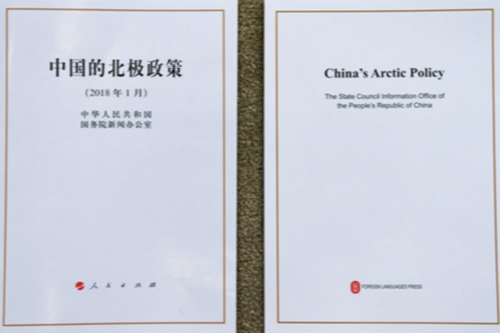
中国的北极政策文章源自英文巴士-https://www.en84.com/4411.html
China’s Arctic Policy文章源自英文巴士-https://www.en84.com/4411.html
文章源自英文巴士-https://www.en84.com/4411.html
中华人民共和国国务院新闻办公室文章源自英文巴士-https://www.en84.com/4411.html
The State Council Information Office of the People’s Republic of China文章源自英文巴士-https://www.en84.com/4411.html
文章源自英文巴士-https://www.en84.com/4411.html
2018年1月文章源自英文巴士-https://www.en84.com/4411.html
January 2018文章源自英文巴士-https://www.en84.com/4411.html
文章源自英文巴士-https://www.en84.com/4411.html
目录文章源自英文巴士-https://www.en84.com/4411.html
Contents
前言
Foreword
一、北极的形势与变化
I. The Arctic Situation and Recent Changes
二、中国与北极的关系
II. China and the Arctic
三、中国的北极政策目标和基本原则
III. China’s Policy Goals and Basic Principles on the Arctic
四、中国参与北极事务的主要政策主张
IV. China’s Policies and Positions on Participating in Arctic Affairs
结束语
Conclusion
前言
Foreword
近年来,全球气候变暖,北极冰雪融化加速。在经济全球化、区域一体化不断深入发展的背景下,北极在战略、经济、科研、环保、航道、资源等方面的价值不断提升,受到国际社会的普遍关注。北极问题已超出北极国家间问题和区域问题的范畴,涉及北极域外国家的利益和国际社会的整体利益,攸关人类生存与发展的共同命运,具有全球意义和国际影响。
Global warming in recent years has accelerated the melting of ice and snow in the Arctic region. As economic globalization and regional integration further develops and deepens, the Arctic is gaining global significance for its rising strategic, economic values and those relating to scientific research, environmental protection, sea passages, and natural resources. The Arctic situation now goes beyond its original inter-Arctic States or regional nature, having a vital bearing on the interests of States outside the region and the interests of the international community as a whole, as well as on the survival, the development, and the shared future for mankind. It is an issue with global implications and international impacts.
中国倡导构建人类命运共同体,是北极事务的积极参与者、建设者和贡献者,努力为北极发展贡献中国智慧和中国力量。为了阐明中国在北极问题上的基本立场,阐释中国参与北极事务的政策目标、基本原则和主要政策主张,指导中国相关部门和机构开展北极活动和北极合作,推动有关各方更好参与北极治理,与国际社会一道共同维护和促进北极的和平、稳定和可持续发展,中国政府发表本白皮书。
A champion for the development of a community with a shared future for mankind, China is an active participant, builder and contributor in Arctic affairs who has spared no efforts to contribute its wisdom to the development of the Arctic region. The Chinese government hereby issues this white paper, to expound its basic positions on Arctic affairs, to elaborate on its policy goals, basic principles and major policies and positions regarding its engagement in Arctic affairs, to guide relevant Chinese government departments and institutions in Arctic-related activities and cooperation, to encourage relevant parties to get better involved in Arctic governance, and to work with the international community to safeguard and promote peace and stability in, and the sustainable development of, the Arctic.
一、北极的形势与变化
I. The Arctic Situation and Recent Changes
北极具有特殊的地理位置。地理上的北极通常指北极圈(约北纬66度34分)以北的陆海兼备的区域,总面积约2100万平方公里。在国际法语境下,北极包括欧洲、亚洲和北美洲的毗邻北冰洋的北方大陆和相关岛屿,以及北冰洋中的国家管辖范围内海域、公海和国际海底区域。北极事务没有统一适用的单一国际条约,它由《联合国宪章》《联合国海洋法公约》《斯匹次卑尔根群岛条约》等国际条约和一般国际法予以规范。
The Arctic is situated at a special geographical location. It commonly refers to the area of land and sea north of the Arctic Circle (approximately 66 degrees 34 minutes N), totaling about 21 million square kilometers. In the context of international law, the Arctic includes the northernmost landmasses of Europe, Asia and North America adjacent to the Arctic Ocean and the relevant islands, and a combination of sea areas within national jurisdiction, high seas, and the Area in the Arctic Ocean. There is no single comprehensive treaty for all Arctic affairs. The Charter of the United Nations, the United Nations Convention on the Law of the Sea (UNCLOS), the Spitsbergen Treaty and other treaties and general international law govern Arctic affairs at present.
北极的大陆和岛屿面积约800万平方公里,有关大陆和岛屿的领土主权分别属于加拿大、丹麦、芬兰、冰岛、挪威、俄罗斯、瑞典、美国八个北极国家。北冰洋海域的面积超过1200万平方公里,相关海洋权益根据国际法由沿岸国和各国分享。北冰洋沿岸国拥有内水、领海、毗连区、专属经济区和大陆架等管辖海域,北冰洋中还有公海和国际海底区域。
The continental and insular land territories in the Arctic cover an area of about 8 million square kilometers, with sovereignty over them belonging to Canada, Denmark, Finland, Iceland, Norway, Russia, Sweden and the United States, respectively. The Arctic Ocean covers an area of more than 12 million square kilometers, in which coastal States and other States share maritime rights and interests in accordance with international law. These coastal States have within their jurisdiction internal waters, territorial seas, contiguous zones, exclusive economic zones, and continental shelves in the Arctic Ocean. Certain areas of the Arctic Ocean form part of the high seas and the Area.
北极域外国家在北极不享有领土主权,但依据《联合国海洋法公约》等国际条约和一般国际法在北冰洋公海等海域享有科研、航行、飞越、捕鱼、铺设海底电缆和管道等权利,在国际海底区域享有资源勘探和开发等权利。此外,《斯匹次卑尔根群岛条约》缔约国有权自由进出北极特定区域,并依法在该特定区域内平等享有开展科研以及从事生产和商业活动的权利,包括狩猎、捕鱼、采矿等。
States from outside the Arctic region do not have territorial sovereignty in the Arctic, but they do have rights in respect of scientific research, navigation, overflight, fishing, laying of submarine cables and pipelines in the high seas and other relevant sea areas in the Arctic Ocean, and rights to resource exploration and exploitation in the Area, pursuant to treaties such as UNCLOS and general international law. In addition, Contracting Parties to the Spitsbergen Treaty enjoy the liberty of access and entry to certain areas of the Arctic, the right under conditions of equality and, in accordance with law, to the exercise and practice of scientific research, production and commercial activities such as hunting, fishing, and mining in these areas.
北极具有独特的自然环境和丰富的资源,大部分海域常年被冰层覆盖。当前,北极自然环境正经历快速变化。过去30多年间,北极地区温度上升,使北极夏季海冰持续减少。据科学家预测,北极海域可能在本世纪中叶甚至更早出现季节性无冰现象。一方面,北极冰雪融化不仅导致北极自然环境变化,而且可能引发气候变暖加速、海平面上升、极端天气现象增多、生物多样性受损等全球性问题。另一方面,北极冰雪融化可能逐步改变北极开发利用的条件,为各国商业利用北极航道和开发北极资源提供机遇。北极的商业开发利用不仅将对全球航运、国际贸易和世界能源供应格局产生重要影响,对北极的经济社会发展带来巨大变化,对北极居民和土著人的生产和生活方式产生重要影响,还可能对北极生态环境造成潜在威胁。在处理涉北极全球性问题方面,国际社会命运与共。
The Arctic boasts a unique natural environment and rich resources, with most of its sea area covered under thick ice for most of the year. The Arctic natural environment is now undergoing rapid changes. Over the past three decades, temperature has been rising continuously in the Arctic, resulting in diminishing sea ice in summer. Scientists predict that by the middle of this century or even earlier, there may be no ice in the Arctic Ocean for part of the year. On the one hand, melting ice in the Arctic has led to changes in the natural environment, or possibly can result in accelerated global warming, rising sea levels, increased extreme weather events, damaged biodiversity, and other global problems. On the other, with the ice melted, conditions for the development of the Arctic may be gradually changed, offering opportunities for the commercial use of sea routes and development of resources in the region. Commercial activities in the region will have considerable impact on global shipping, international trade and energy supply, bring about major social and economic changes, and exert important influence on the way of work and life of Arctic residents including the indigenous peoples. They may also pose a potential threat to the ecological environment of the Arctic. The international community faces the same threat and shares the same future in addressing global issues concerning the Arctic.

